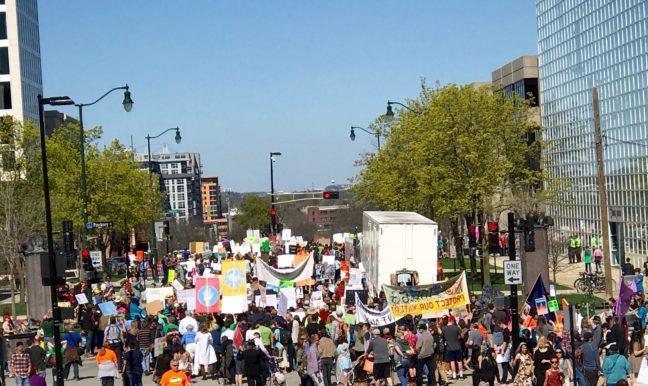In celebration of Earth Day and to show solidarity with the rest of the world marching against climate change, thousands of Wisconsinites gathered at the state Capitol to demand change in the ways humans and companies use natural resources.
The Madison Climate March began at the Wisconsin State Capitol and ended at Madison Gas & Electric, one of the largest energy companies in the city.
The Climate March accompanied the March for Science. About 5,000 people showed up for the March for Science and 2,500 for the Climate March. Both events took place without incident according to a Madison Police Department report.
https://twitter.com/emjanet1001/status/855863167871836160
According to the Environmental Protection Agency, the Earth’s average temperature has risen 1.5 degrees Fahrenheit over the past century, and is expected to rise another 0.5 to 8.6 degrees in the next hundred years. Climate change is the result of human activity, which has led to the melting of glaciers and other changes in weather.
If not stopped, scientists speculate climate change will present challenges for the human race.
The goal of the march was to encourage MG&E to be a “clean energy leader” for the state, according to Madison’s Climate March website.
Speakers and marchers from around the state encouraged the Madison community to take action to change the way energy is used around us to help future generations.
The speeches had a theme of encouragement about living sustainably now to create an environment that will last for future generations.
https://twitter.com/emjanet1001/status/855873388883169281
Sustainability programs reduce food waste, help manage insecurity
Beth Esser, co-founder of MG&E Shareholders for Clean Energy, spoke about utility companies and the dangers they place on the Earth through their use of fossil fuels and coal. Her goal is to encourage MG&E to use more renewable energy as an alternative to fossil fuels.
“I want good, family supporting jobs and a healthy environment,” Esser said. “[Choosing between a] job or the environment is a false choice.”
Tony Schultz, an organic farmer from Athens, Wisconsin, spoke about the harm industrial agriculture has on the planet and the positives small organic farming brings to the land, community and planet.
Schultz said small farms produce more food per acre, which uses land, water and oil “much more efficiently.”
Jessie Brown, an environmental activist, spoke about her experiences at Standing Rock protesting the Dakota Access Pipeline. As an indigenous Mayan woman, she said she places great emphasis on her work protecting Native tribes.
“We march for those who fought before us. My ancestors fought — they were warriors, and so am I,” Brown said. “This is my fight now.”
https://twitter.com/emjanet1001/status/855875602737451009
Madison community continues to stand in solidarity with Standing Rock
Cindy Bacskai came from Milwaukee to support renewable energy efforts to take care of the climate.
Bacskai said she wants her children to experience the things she’s been able to enjoy such as hiking and animals.
“We can make a difference as the average citizen,” Bacskai said.
Chloe Zick, Kirby Tock and Caroline Schick, high school seniors from Baraboo, Wisconsin, came to the march to encourage other young people to “start now” when it comes to making a difference for the environment.
https://twitter.com/emjanet1001/status/855880857915183104
UW expert looks to encourage students to fight for cleaner future
Zick said the best way to ensure a future in the U.S. is to live sustainably and take care of the environment.
“Nothing’s going to change unless we make a change,” Zick said.












